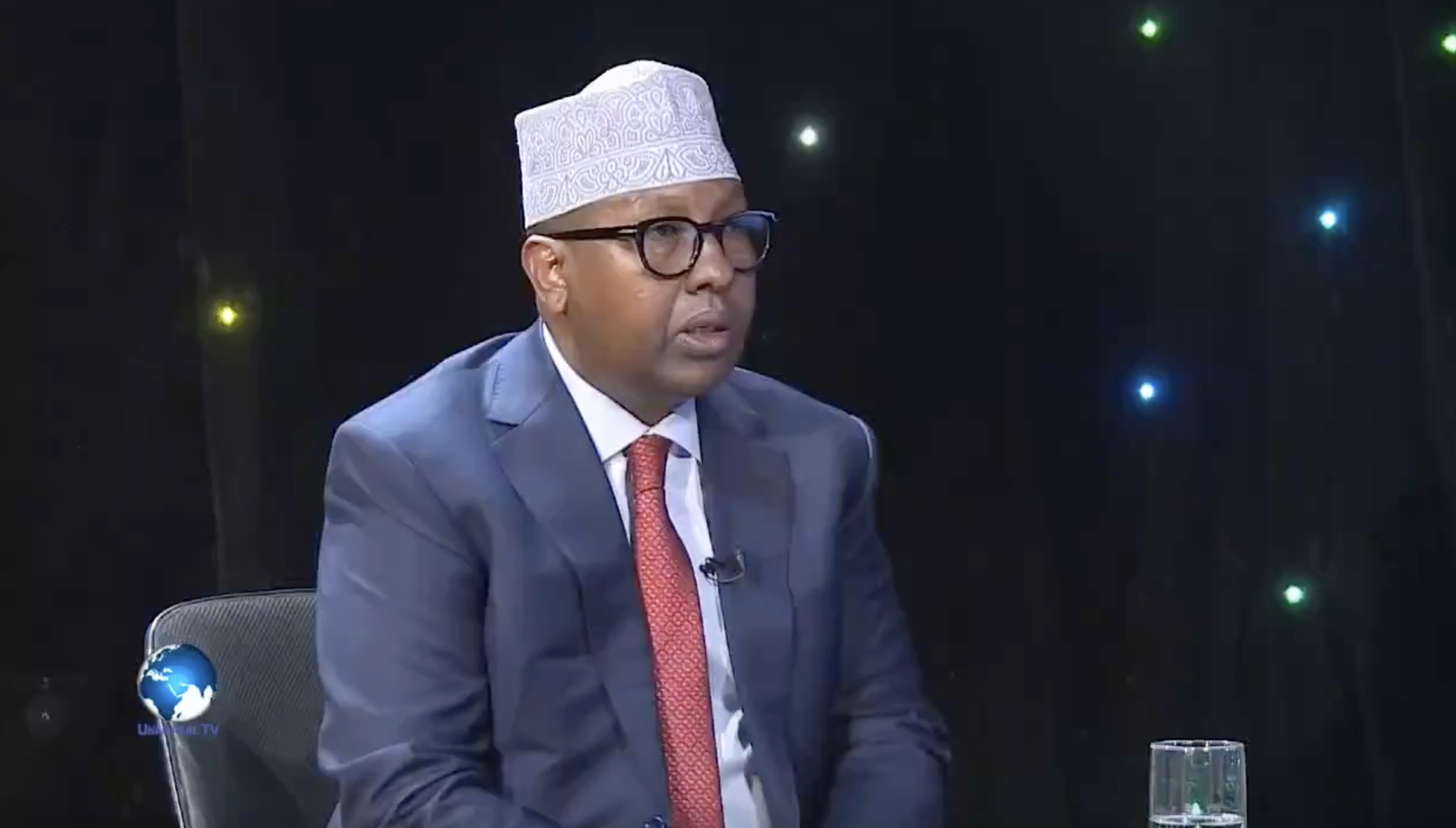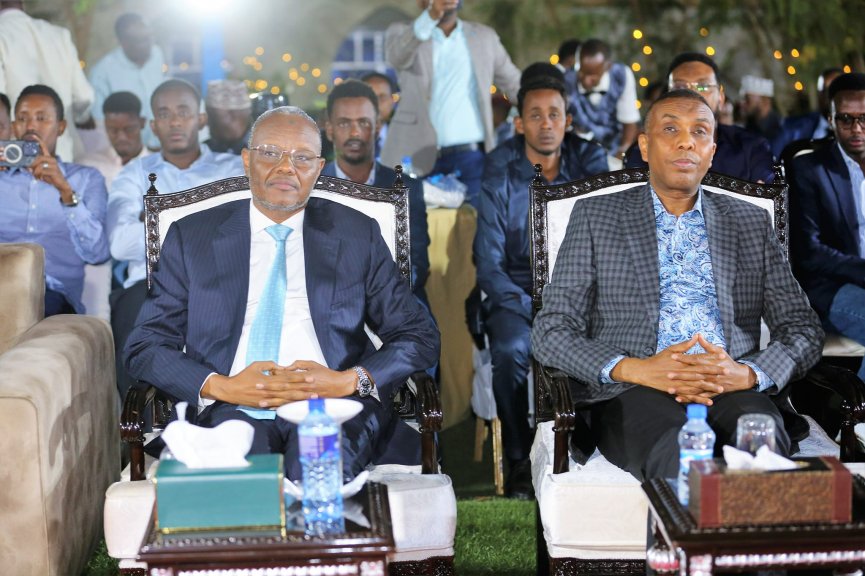
'No Ethiopian Encroachment in Somalia' Says Somali FM Amid Tensions With Egypt
|
13 September 2024 21:02

MOGADISHU, Somalia (HORN OBSERVER) - Somalia's Foreign Minister, Ahmed Fiqi, has dismissed allegations that Ethiopia violated Somalia's sovereignty, asserting there have been "no Ethiopian encroachments in Somalia."

In an interview with Universal TV on Thursday, Fiqi clarified that Ethiopia has not crossed into Somali territory, but added, "If it does, Somalia will be prepared."
These comments contrast with previous statements from Somalia’s Ambassador to the United Nations, who repeatedly told the UN Security Council that Ethiopia had breached Somalia’s sovereignty.
Similarly, President Hassan Sheikh Mohamud had earlier accused Addis Ababa of not respecting Somalia’s territorial integrity.
Foreign Minister Ahmed Fiqi, himself a former Islamic Courts Union member, also confirmed that Egypt delivered weapons to Somalia last month after two military aircraft landed in Mogadishu, emphasizing that the arms were intended for the fight against the militant group Al-Shabaab.
"Yes the military cargo planes arrived. The weapons are being used for the fight against Al-Shabaab," he added.
Addressing reports that Egypt may deploy forces to Somalia as part of a proxy war with Ethiopia, Fiqi stated, "There is no decision yet” on such a deployment.
The backdrop to these tensions is the decade-long dispute between Egypt and Ethiopia over the Grand Ethiopian Renaissance Dam (GERD), which Egypt claims threatens its water security. Despite Ethiopia’s progress on the dam, including partial power generation, Egypt has limited its response to diplomatic pressure, including appeals to the UN Security Council.
However, Egypt’s increased military involvement in Somalia, including sending military cargo planes to Mogadishu in August, has raised concerns of a potential proxy war between Cairo and Addis Ababa. Reports suggest Egyptian military and intelligence officers have been present on the ground in Somalia.
The plan to deploy Egyptian forces has already faced significant opposition, particularly from Somali regional states, where many view it as a direct threat. Opposition to the deployment is especially strong among non-Mogadishu clans, who fear it could not only lead to a repeat of the 1990s scenario, when Egypt provided arms to Hawiye clan militias that attacked regions inhabited by non-Hawiye clans, but also escalate into a proxy conflict between Egypt and Ethiopia.
In response to these growing tensions, Somali Prime Minister Hamza Abdi Barre on Thursday night made a public declaration, distancing his administration from the conflict. Speaking in Baidoa, the interim capital of the Southwest State, Barre stated that Somalia would not permit Egypt to bring its proxy war with Ethiopia into Somali territory.
He emphasized that his government would not allow external forces "to kill each other inside Somalia.”
Barre’s remarks seem aimed at addressing local concerns that Egypt might be seeking to open a new front against Ethiopia, Somalia’s neighbor and a key player in regional security.
"We will not allow other governments to fight in our country. We will work to ensure that conflicts between other governments, [Egypt and Ethiopia], remain between them,” said Barre, who holds both Somali and Ethiopian citizenship.

During his visit to Baidoa, primer minister Barre met with local leaders, including members of President Abdiasis Laftagareen’s cabinet, Rahanweyn clan elders, and community leaders. The discussions focused on the strong local support for Ethiopian peacekeepers, who play a vital role in securing the region.
Barre’s visit to Baidoa followed criticism from President Laftagareen of the Southwest State, who opposed the proposed deployment of Egyptian forces. The state leadership has endorsed recent protests supporting Ethiopian peacekeepers in the Bakool region and has signaled growing frustration with Mogadishu.
Laftagareen’s government has even hinted at pursuing an independent security path if Mogadishu continues to disregard the state’s preferences.
Prime minister Barre’s shift comes at a time when President Hassan Sheikh Mohamud’s administration faces accusations of close ties to Egypt, fueled by suspicions of sectarian connections. President Mohamud has long been suspected of having links to the Muslim Brotherhood, despite Egypt’s own crackdown on the group.
Recent reports have suggested that Barre, along with Somali intelligence officials, was granted residency in Egypt, while Egypt has continued to send military support to Mogadishu amid the ongoing Nile River dispute.
Leave a comment
- Popular
- Rated
- Commented
04/11/2021 - 11:05:02
28/05/2024 - 15:44:10
02/12/2021 - 11:34:53
01/03/2021 - 09:00:37
Opinions
18/05/2025 - 16:26:37
15/05/2025 - 20:16:04
Politics
17/04/2025 - 01:58:17
13/04/2025 - 10:59:05
Terror Watch
30/05/2025 - 00:04:19
18/05/2025 - 00:37:46
Press Releases
02/06/2025 - 21:29:33
 0
0 




































'No Ethiopian Encroachment in Somalia' Says Somali FM Amid Tensions With Egypt
MOGADISHU, Somalia (HORN OBSERVER) - Somalia's Foreign Minister, Ahmed Fiqi, has dismissed allegations that Ethiopia violated Somalia's sovereignty, asserting there have been "no Ethiopian encroachments in Somalia."